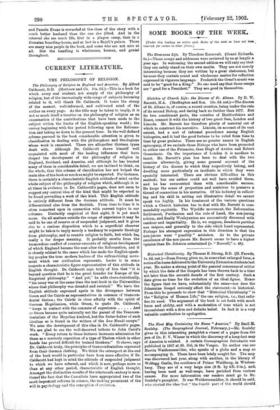Sketches of Church Life : the Diocese of St. Albans.
By D. W. Barrett, MA. (Skeffington and Son. 10s. 6d. net.)—The diocese of St. Albans is, of course, a recent creation, being under the rule of its second Bishop, and dating back no further than 1877. But its two constituent parts, the counties of Hertfordshire and Essex, connect it with the history of two great Sees, London and Lincoln. Mr. Barrett has therefore plenty of material out of which to construct his narrative. Lincoln, on account of its vast extent, had a sort of informal precedence among English bishoprics, and it had the good fortune to be ruled from time to time by great prelates. There are no greater names in English episcopacy, if we exclude those Bishcps who have been promoted to either one of the Primacies, than Hugh of Avalon and Robert Grosseteste. On the importance of London it is needless to insist. Mr. Barrett's plan has been to deal with the two counties alternately, giving some general account of the history of the diocese to which they respectively belong, and dwelling more particularly on incidents in which they were specially interested. There are obvious difficulties in this method ; but our author could not well have avoided them, and he has surmounted them with considerable success. He keeps the sense of proportion and contrives to preserve a thread of connection in his narrative. Of his industry in collect- ing and his skill in setting out illustrative detail we cannot speak too highly. In his treatment of the various questions which a Church historian has to deal with Mr. Barrett is com- mendably equitable. The Wycliffe movement, the Reformation Settlement, Puritanism and the rule of Laud, the non-juring schism, and finally Wesleyanism are successively discussed with candour and impartiality. He is, we suppose, Laudianis partibus non iniquus, and generally to the side which Laud represented. Perhaps his strongest expression in this direction is that the non-jurors were " possibly" mistaken. As to the private excellence of the non-jurors Mr. Barrett seems to have a higher opinion than Dr. Johnson entertained (v. "Boswell," c. 48).










































 Previous page
Previous page